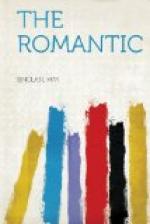“Don’t hate it. Don’t hate it. I want you to understand his cruelty. It wasn’t just savagery. It was something subtler. A supreme effort to get power. Remember, he couldn’t help it. He had to right himself. Supposing his funk extinguished something in him that could only be revived through cruelty? You’ll say he could help betraying you—”
“To you, too?”
“To me, too. When you lost faith in him you cut off his main source of power. You had to be discredited so that it shouldn’t count. You mustn’t imagine that he did anything on purpose. He was driven. It sounds horrible, but I want you to see it was just his way of saving his soul, the only way open to him. You mustn’t think of it as a bad way. Or a good way. It wasn’t even his way. It was the way of something bigger than he was, bigger than anything he could ever be. Bigger than badness or goodness.”
“Did ‘it’ do cowardly things to ‘save’ itself?”
“No. If Conway could have played the man ‘it’ would have been satisfied. It was always urging him.” ... “Try,” he said, and she knew that now at any rate he was sincere; he really wanted to help her; he was giving her his best. His voice was very quiet now, his excited gestures had ceased. “Try and think of it as something more real, more important and necessary than he was; or you and I. Something that is always struggling to be, to go on being. Something that degeneracy is always trying to keep under.... Power. A power in retreat, fighting to get back its lost ground.”
Then what she had loved was not John Conway. What she had hated was not he. He was this Something, tremendous and necessary, that escaped your judgment. You couldn’t hurt it with your loving or hating or your ceasing to love and hate. Something that tortured you and betrayed you because that was the only way it knew to save itself.
Something that couldn’t save itself altogether—that clung to you and called to you to save it.
But that was what she had loved. Nothing could touch it.
For a moment while McClane was talking she saw, in the flash he gave her, that it was real. And when the flash went it slipped back into her darkness.
But on the deck in front of her she could see John walking up and down. She could see the wide road of gold and purple that stretched from the boat’s stern to the sun. John’s head was thrown back; he looked at her with his shining, adventurous eyes. He was happy and excited, going out to the war.
And she saw them again: the batteries, the cars and the wagons. Dust like blown smoke, and passing in it the long lines of beaten men, reeling slowly to the footway, passing slowly, endlessly, regiment by regiment, in retreat.



